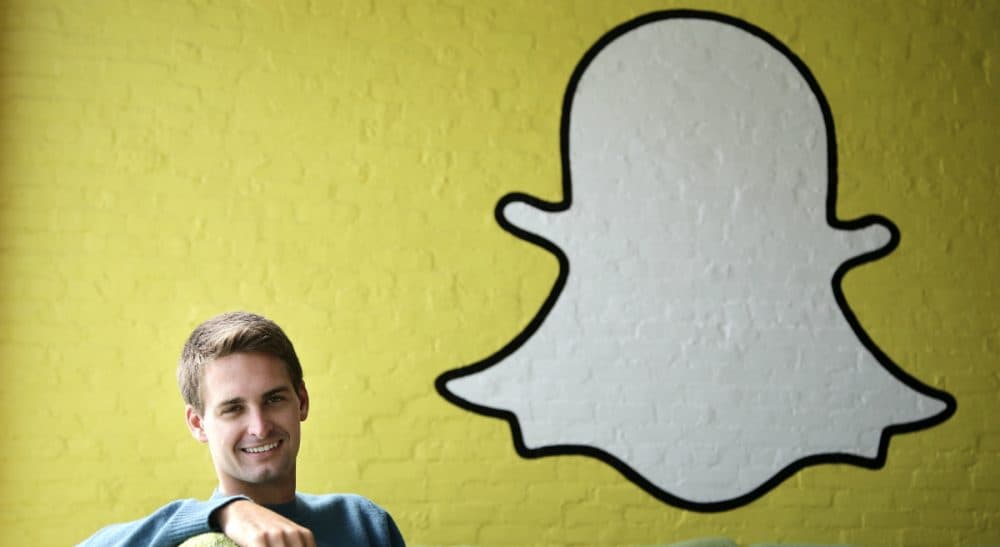Advertisement
Where Delete Is The New Default: Welcome To The Erasable Internet

Tired of carrying all that digital flotsam and jetsam through life? Fed up with those photos of you wearing a lampshade forever being tagged on Facebook?
Well, my friends, just move to the Erasable Internet, where the mantra is “delete is the new default.”
It was Snapchat that put the shelf life Web on the public radar screen. The photo-sharing service allows users to set a time limit on photos or videos they send to others, a kind of digital spontaneous combustion. It’s very “Mission: Impossible.”
From there, the apps just kept on coming — from Telegram (self-destructing text/images/video) to Frankly (text sent in a blurred box — tap it and a timer counts down to deletion) to Wickr and Blink, all of which make digital content disappear so it’s not attached to you for life.
The sidecar to the Erasable Internet is the Anonymous Web, in which content remains in the digital realm but is not attached to you at all. In other words, the content stays but you disappear.
For a variety of reasons, neither of these parallel universes -- archival/super fresh, erasable/indelible -- will replace the other. But they do create an interesting digital two-step for people to execute.
(The sidebar to this trend is the NYM Wars, a battle over whether you need to attach your real identity to your digital activities or whether you can employ a pseudonym. Increasingly, websites and apps — from music streaming service Spotify to digital slots parlor myVegas to ride-sharing app Lyft to ESPN conversation boards — have begun requiring people to sign in with Facebook. The more that happens, the more your Facebook identity becomes a sort of digital passport. And the more Facebook founder Mark “Data” Zuckerberg likes it.)
The Anonymous Apps du jour are Whisper and Secret, social networks that allow users to reveal secrets, fantasies, failings — whatever you like — with no names attached. Whisper, which claims to get 3.5 billion visits a month, is a sort of open-air confessional: You spill, they post, anyone can see it.
Representative sample:
Advertisement
I have 4 roommates and dislike them all. One also stole some of my things, and she knows my schedule but always insists on hogging the bathroom. I’m scrubbing the toilet with her toothbrush right now.
Secret provides a more exclusive social networking service, sending messages only to the contacts in a user’s smartphone address book. Both Secret and Whisper assure skeptics that they won’t tolerate anyone making damaging or bullying use of the service.
Uh-huh. And Miley Cyrus won’t let fame go to her head.
Ephemeral — and anonymous — messaging sets up a parallel digital universe to the one established by, say, Facebook and Google. Each has its advantages and disadvantages. The permanent web might mean the “end of forgetting,” as one analyst put it, but the free Internet relies on our information being captured, saved and sold to marketers.
The disappearing web, on the other hand, is hardly foolproof. Anyone can grab a screenshot of a Snapchat photo, for example, and even if no one does, the image likely lingers somewhere. And Whisper reportedly reserves the right to sell its content posted to third parties, presumably marketers.
This is part of an overall bifurcation of the Internet into the archival web and the real-time (or “super-fresh”) web. Google is archival — it gives you what’s been popular and reliable, and, most important, what reflects your digital past. Twitter, on the other hand, gives you what’s happening right now — a whole different kind of search engine fueled by hashtags.
For a variety of reasons, neither of these parallel universes -- archival/super fresh, erasable/indelible -- will replace the other. But they do create an interesting digital two-step for people to execute. Perhaps we’ll all develop dual digital personas with entirely different footprints — one that’s identifiably ours, the other just a shadow trail.
But don’t quote me on that.
Related:
